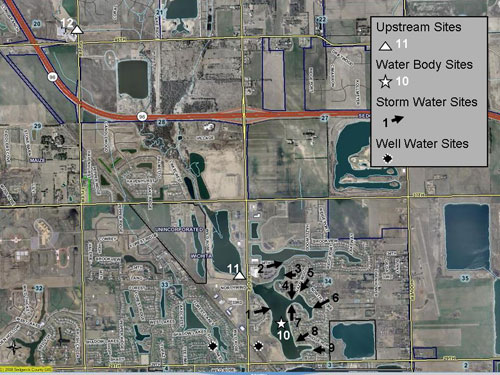Wichita has many areas of sandy soils with high water tables. In the recent past, this sand has been mined for commercial purposes, resulting in a sand pit that fills with groundwater. Residential and commercial development quickly occurs around the resulting lake. Storm water drains from the residential lawns, parking lots, driveways and roads, where it is directed into the lake.
The Big Slough Creek runs through and connects some of these sand pits. Because of the diversity of development in this watershed and also because of the permeable soils and high water table, there is concern about the effect of storm water runoff on surface and groundwater in the area. Storm water may carry with it pollutants such as petroleum products, fertilizers, fecal coliform, and other contaminants from unknown sources.
Six sand pits have been studied within this area. Three monitoring wells for each sand pit were drilled according to specifications of the United States Geological Survey. Testing of these wells has been undertaken in order to determine which pollutants (if any) are present and whether they are filtered out through the sand prior to reaching the groundwater. Once the type of contaminant is determined, the appropriate best management practice (BMP) can be implemented.
An extension to this project has been initiated in the Ridge Port neighborhood. The water quality specialist for Sedgwick County Conservation District coordinates the storm water sampling in this specific drainage area.
The goal is to determine whether pollutants carried by storm water runoff into sand pits affects the quality of the groundwater underlying and surrounding these pits.
